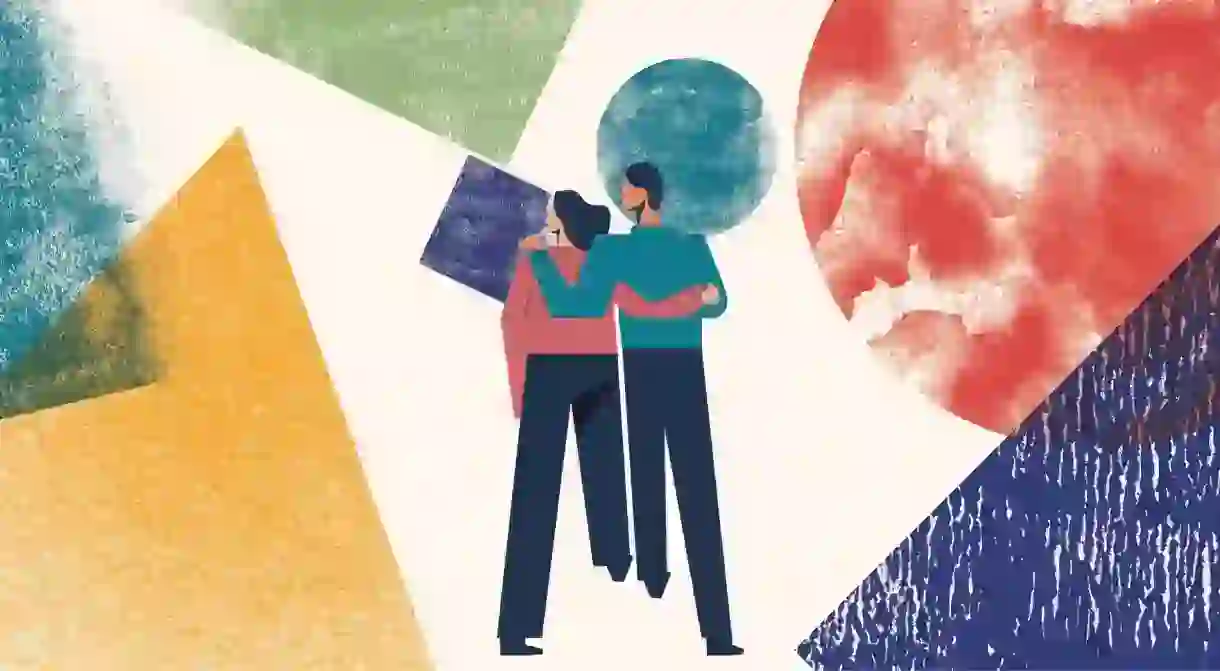These 8 Stages of Arabic Romance Will Make You Fall in Love With the Language

This article is part of our Explore Your World Through Language campaign.
The Arabic language ascribes specific stages to the process of falling in love. From ancient Sufi poetry and the adored story of Layla and Majnum (a Romeo and Juliet of sorts), or, in modern times, the sensual poetry of Nizar Qabbani and the soulful singing of Fayrouz, these stages have inspired countless writers and artists. Here we explore all eight in turn.
Al-Hawa – Interest
This stage is when love is still only a fleeting notion, perhaps felt during the early days of a crush. The root of the word means ‘to blow’, suggesting that feelings are still likely to change quickly with the wind. The love may grow or quickly die.

Al-Sabwah – Desire
The second stage is when there’s a mutual and friendly enjoyment of each other’s company. This word has the connotation of wanting someone, though still with the restraint of playful flirtation. It’s more about physical attraction and doesn’t imply a relationship.

Al-‘Alaqah– Attachment
This is when there is an attachment to the other from deep in the heart; what exists between the two parties can now be considered an actual relationship. The root verb of this word means ‘to become attached to’ or ‘to cling to’, implying that the connection between the pair has reached dependency.

Al-Kalaf – Deep fondness
The fourth stage is when the love begins to hurt or cause certain levels of distress. This amount of love now causes physical reactions, and is similar to the English saying ‘I love you so much it hurts’. Many associate this word with feelings of infatuation.

Al-‘Ishq– Adoration
This describes the feeling when infatuation properly takes hold, spreading thoroughly throughout the heart. The roots of this word hold connotations such as ‘to become nested in’, ‘to be covered in’ and even ‘to become blind to’. This is the highest stage of pleasurable passion before love becomes darker, more meaningful. The love is now all-consuming.

Al-Najwa– Heartache
This stage brings a certain amount of sadness from being too in love. This word originally comes from the Arabic for ‘salvation’, meaning that the feelings are so hopeless and painful that lovers need saving. Reaching this stage, however, can allow both sides to completely open up and engage in deep conversations about their vulnerability.

Al-Wodd– Friendliness
The seventh stage is when, after exposing their grief and vulnerability, both sides are able to express the purest form of love and show genuine companionship for each other after all the suffering and heartache they have been through. The lovers are now also the best of friends. This stage also has connotations of delicacy and gentleness, as each side has learned to protect and love each other’s vulnerable flaws.

Al-Huyum– Insanity
The final and fullest stage of love is when there is a complete freedom in the madness and crazy feelings after going through the long journey of love together. This stage indicates that the lovers have lost all reason and will now let their passions and emotions run wild. The verb from the root letters of this word can also mean ‘to perish’, meaning that the lovers will eventually perish in happiness and bliss after finally finding someone worth going through all these stages for.

For many Arabs, the word al-huyum is a favorite because it embodies what many believe to be the best part or the true meaning of love: a complete and joyous freedom in loving the other. In Arab culture, death or the idea of perishing isn’t a negative thing, and to die in the arms of your love or to perish with the full feelings of being in love is one of the best ways to leave this earth. While this doesn’t always have to mean physical death, it can also symbolize a ‘mental death’ in which the person needn’t have a care in the world anymore, now that they’ve found the love of their life.
This article is part of our Explore Your World Through Language campaign. If you enjoyed this exploration of the wonders of words, why not sink your teeth into these great pieces:
You’re Guaranteed to Win Every Argument With These 11 Multilingual Insults
These Silent Signals Don’t Always Mean What You Think













